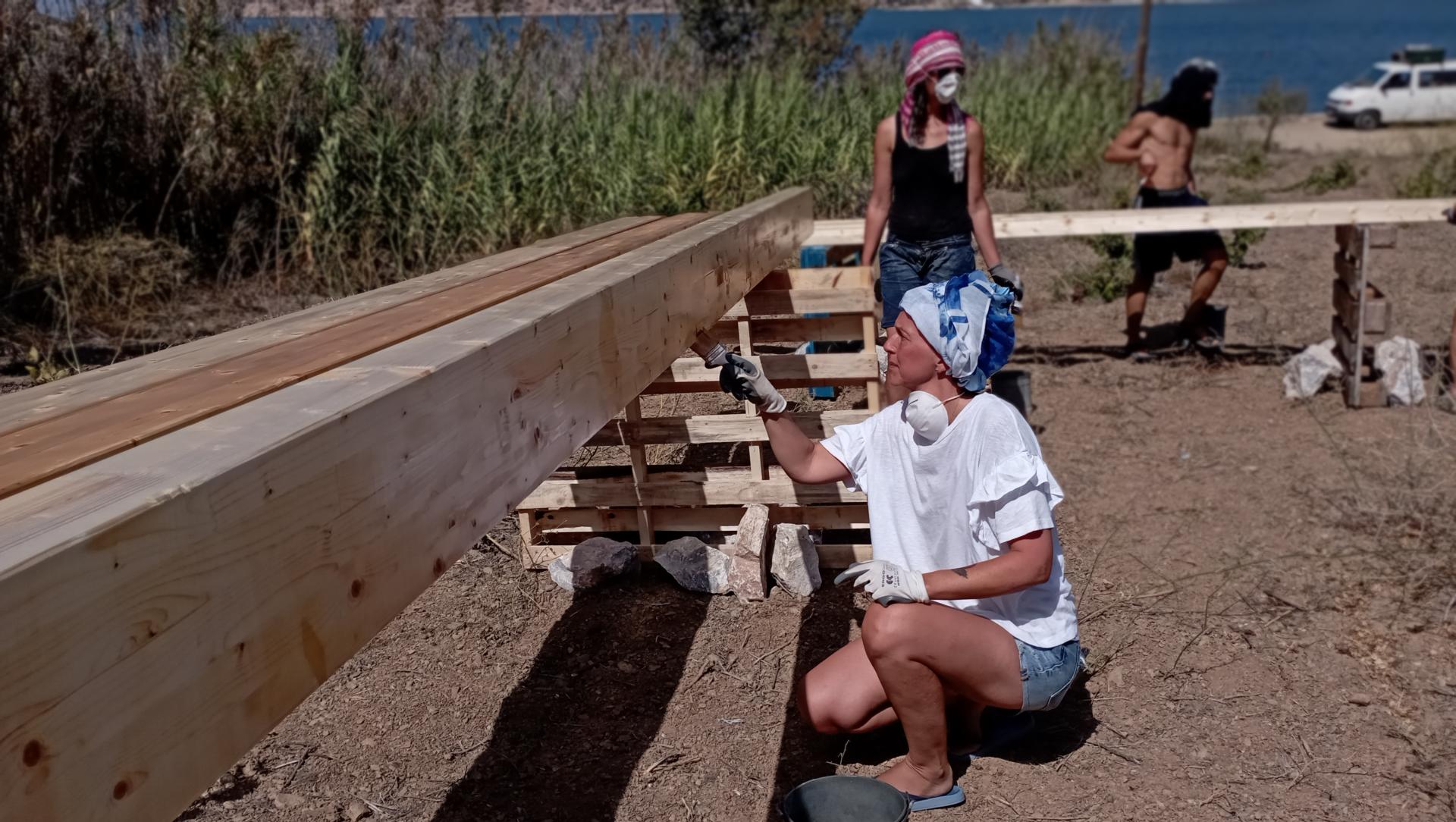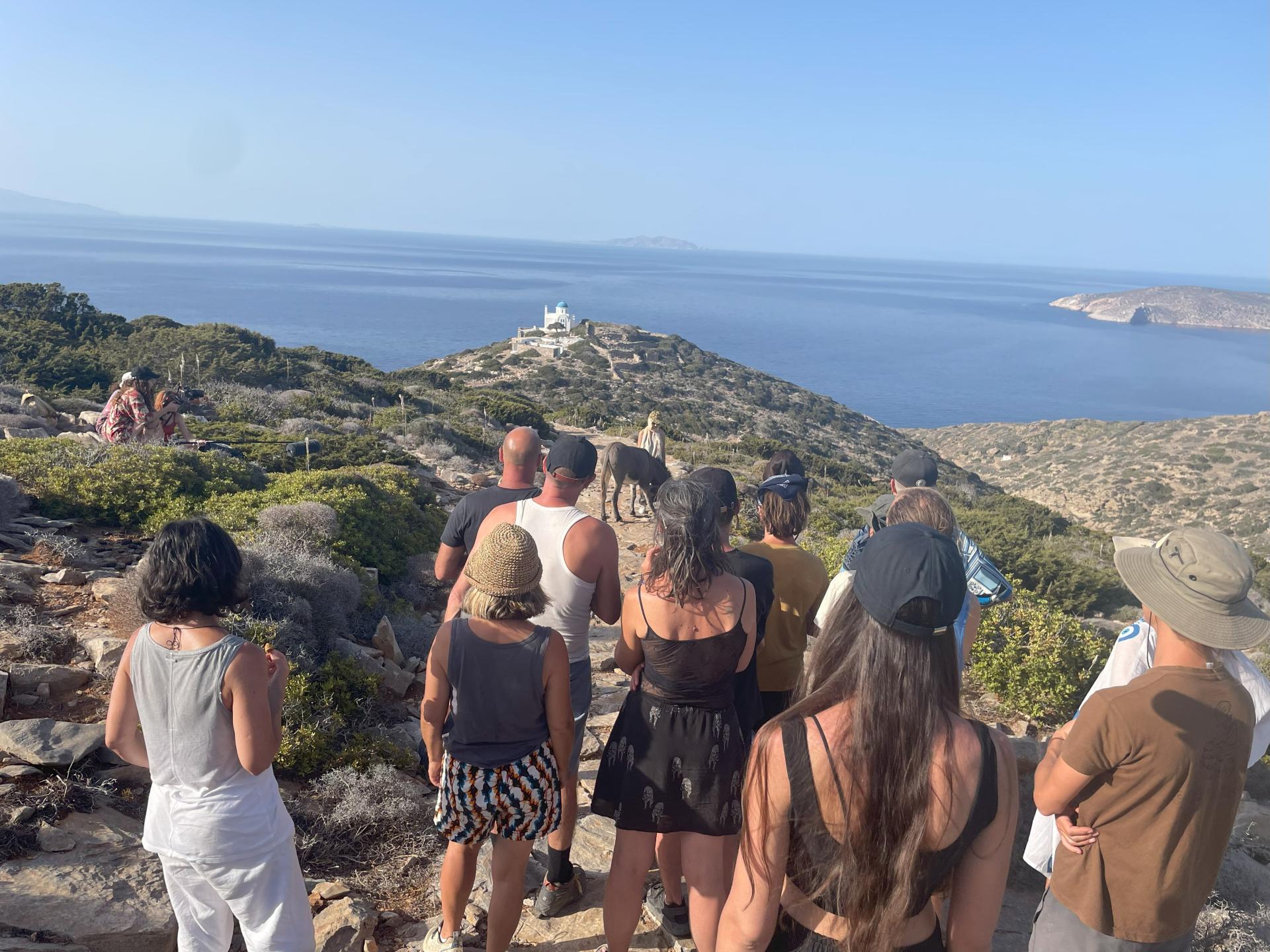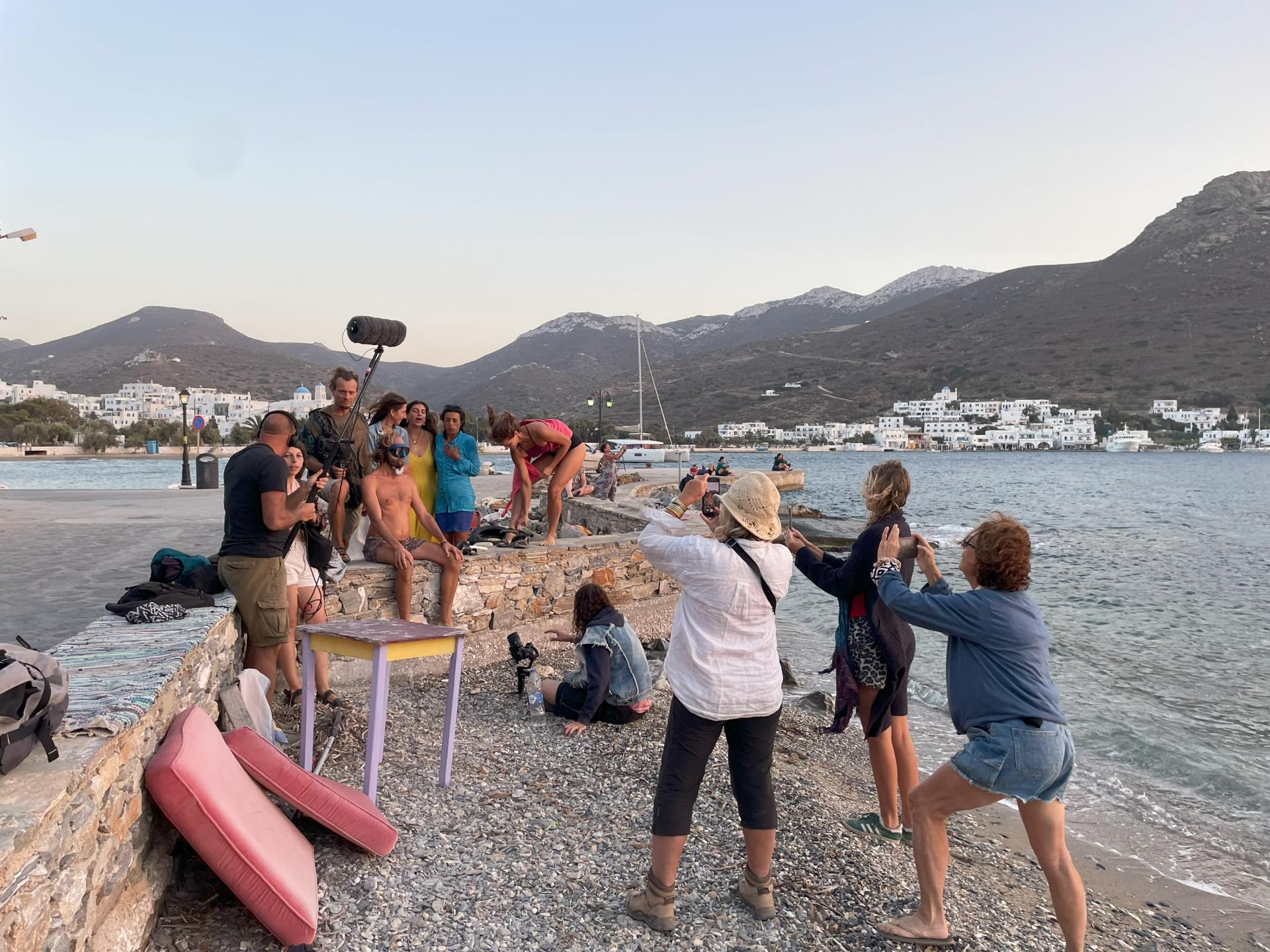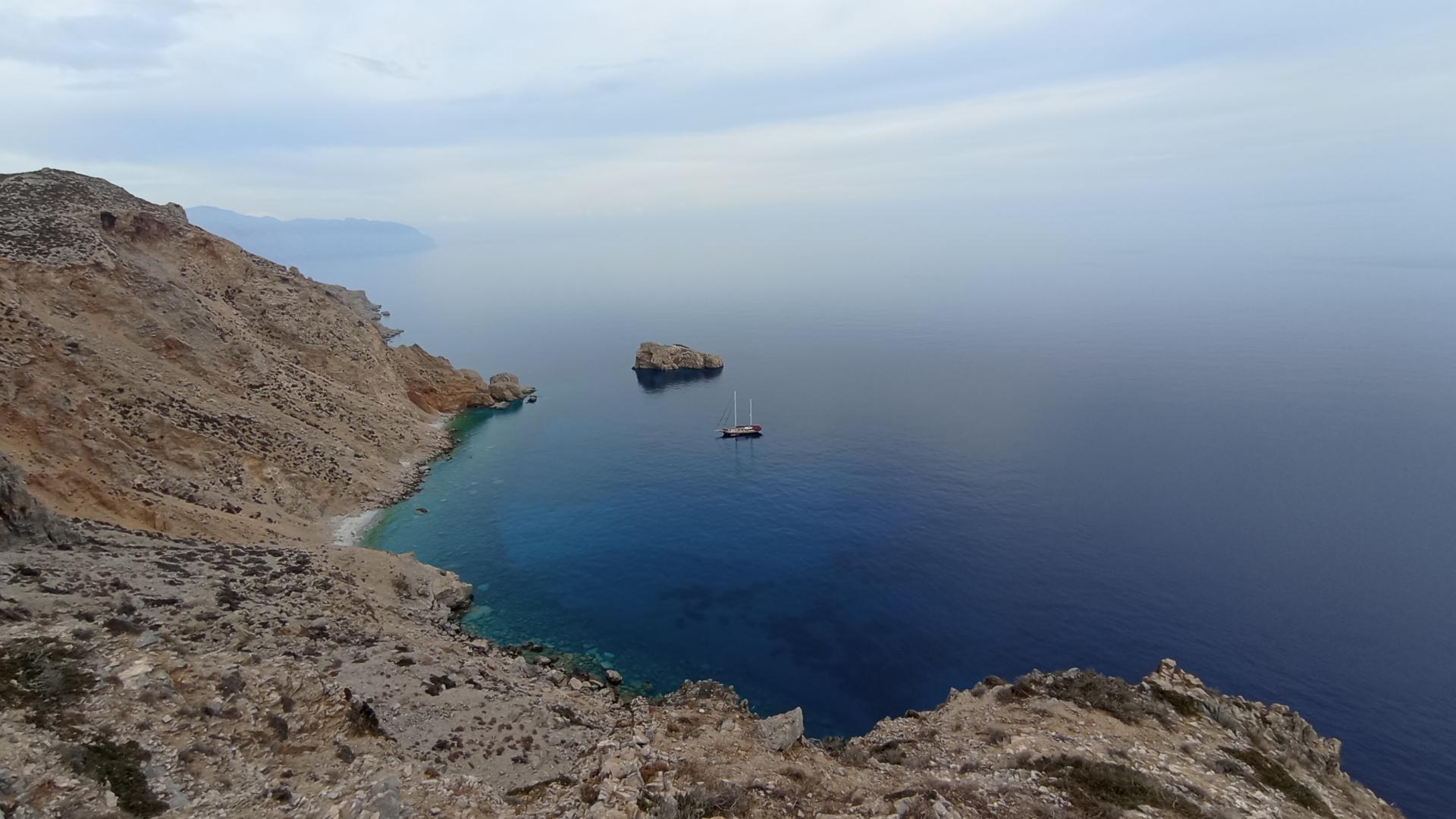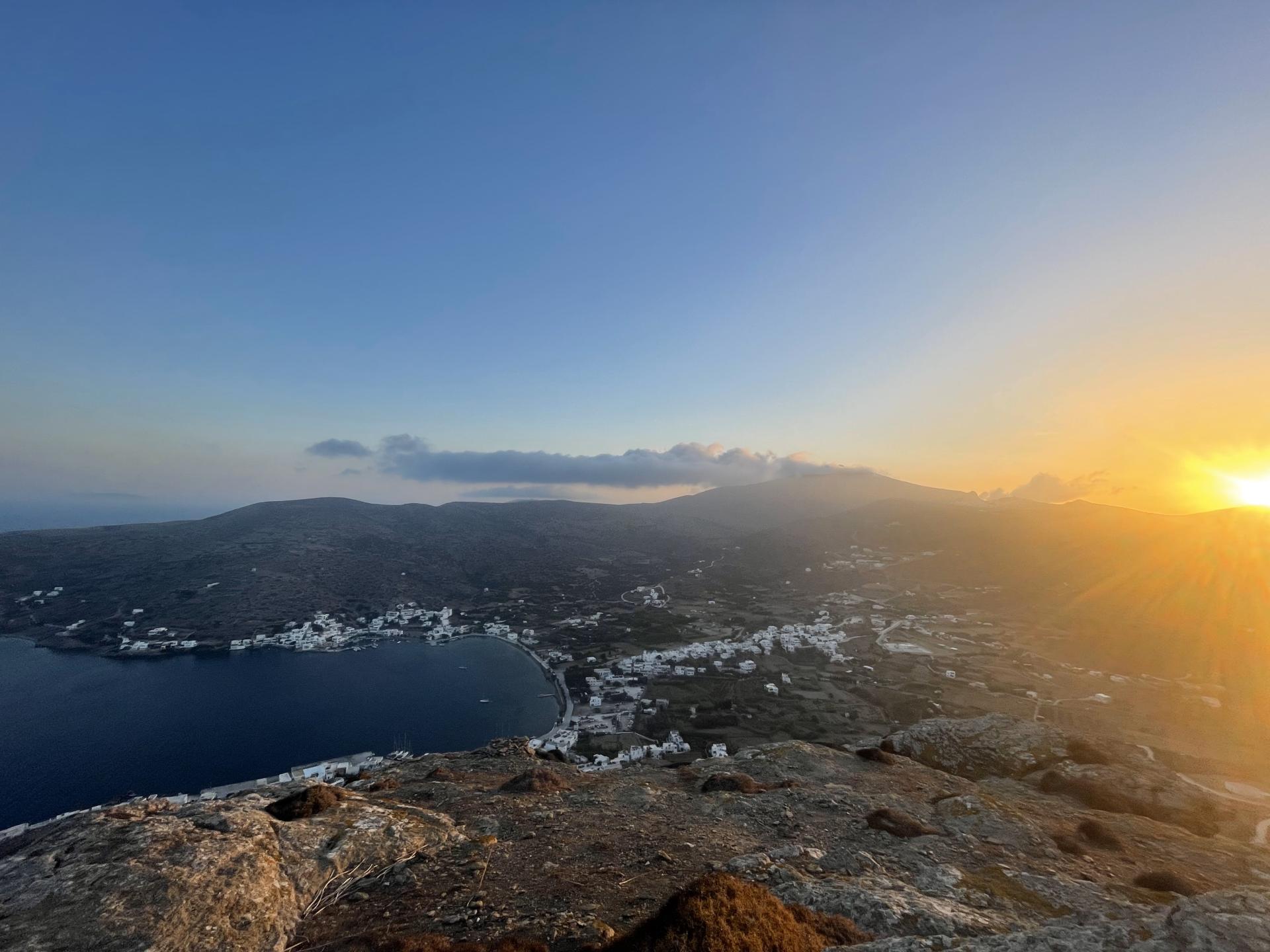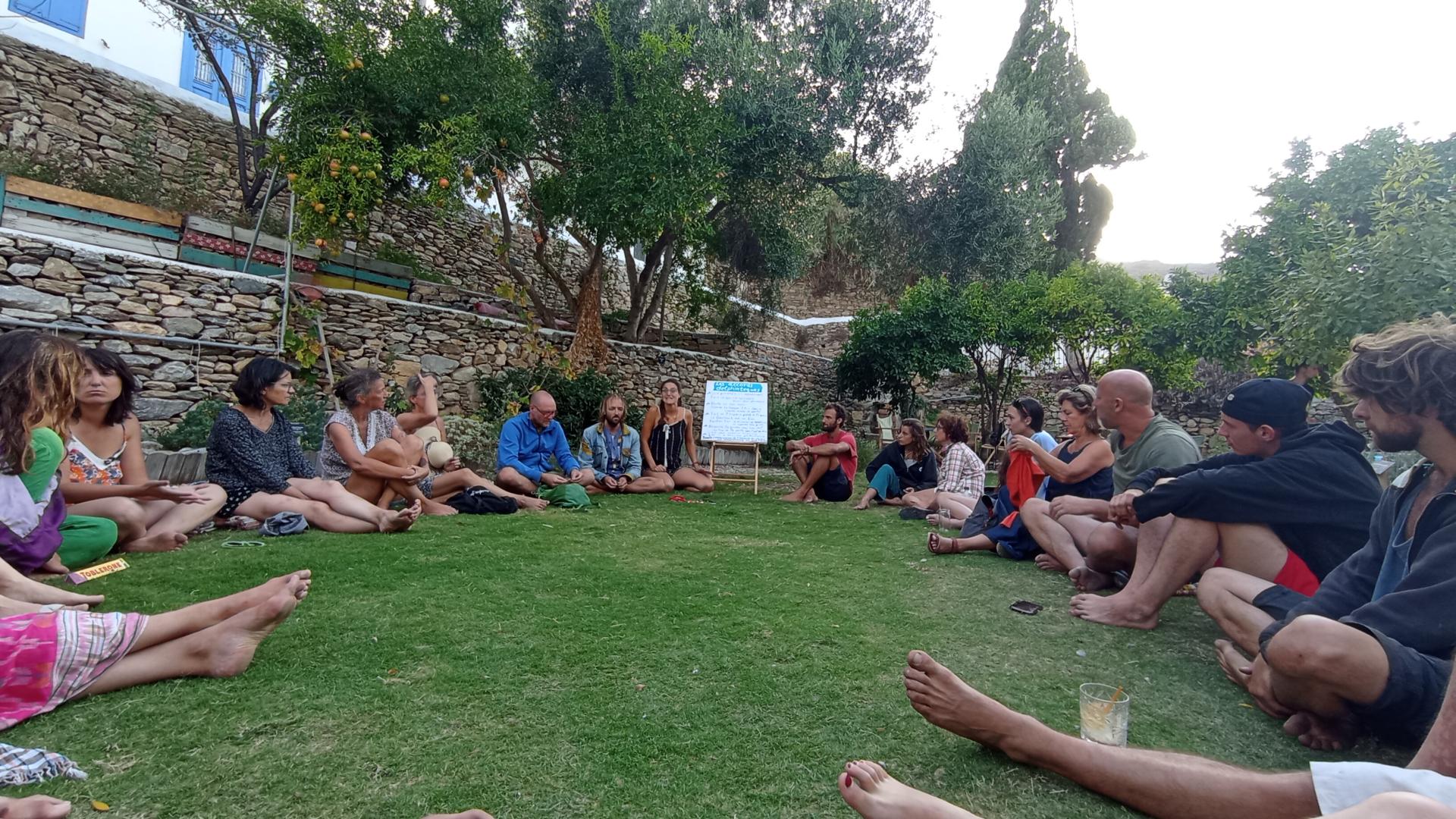Looking for the big blue
Basic information
Project Title
Looking for the big blue
Full project title
Dolphin Ambassadors looking for the big blue: a European network for ecology and the arts
Category
Reconnecting with nature
Project Description
Eco-poethical journeys in Greece exploring the beauty of ecosystems and encouraging individuals to embrace their role as stewards of the Earth.
These poetic explorations not only celebrate the enchanting connection between humans and dolphins but also serve as powerful calls to action. Journeys go beyond mere observation, creating opportunities for poetic self-actualization, fostering ecological literacy, and instilling a deep sense of ethics of care for our planet.
These poetic explorations not only celebrate the enchanting connection between humans and dolphins but also serve as powerful calls to action. Journeys go beyond mere observation, creating opportunities for poetic self-actualization, fostering ecological literacy, and instilling a deep sense of ethics of care for our planet.
Geographical Scope
Local
Project Region
Amorgos (Greece), Nantes and Loire Atlantique région (France) , Greece
Urban or rural issues
Mainly rural
Physical or other transformations
It refers to other types of transformations (soft investment)
EU Programme or fund
Yes
Which funds
ERASMUS
Description of the project
Summary
‘Chaux Must Go On’ was a 14-day learning journey in September 2023 on Amorgos island, Greece. It aimed to enhance the eco-poethical attitudes, skills, and knowledge of 20 low-skilled adult learners from Artichaut association's creative workshops. Assisted by 2 skilled staff members, they collaborated with three local organizations: Amorgos Botanical Park, Municipal Camping of Amorgos, and the Mitato of Amorgos.
The main goal, inspired by the natural element of lime ('chaux' in French), aimed to cultivate harmony between participants and nature through eco-construction, green practices, and meetings with ecological professionals. The second objective focused on Poetic self-actualization, using artistic expression, theater, and improvisation to develop intelligences and foster emotional and intellectual freedom.
The program targeted young and middle-aged adults (average age 42) facing social disadvantages or career challenges, especially those with limited education and job prospects. A 2022 survey indicated that most learners encountered obstacles related to employment, health, geography, sociocultural factors, and life transitions. Post-pandemic, the initiative welcomed adults navigating midlife transitions, seeking psychological support, retraining, creative outlets, confidence, inspiration, empowerment, and a reconnection to nature and community.
Artichaut association has organized two Erasmus-funded mobilities: “Dolphin Ambassadors” in 2022 and “Chaux Must Go On.” We applied for accreditation in the field of Adult Education in October 2023 to broaden our actions' scope and consolidate a European network for ecology and the arts.
The project left a profound impact on individuals and reached local, national, and international levels. Participants expressed high satisfaction, describing it as 'life-changing.' Significant outcomes included reconnection to self, others, and the environment, leading to positive behavioral changes in ecological practices.
The main goal, inspired by the natural element of lime ('chaux' in French), aimed to cultivate harmony between participants and nature through eco-construction, green practices, and meetings with ecological professionals. The second objective focused on Poetic self-actualization, using artistic expression, theater, and improvisation to develop intelligences and foster emotional and intellectual freedom.
The program targeted young and middle-aged adults (average age 42) facing social disadvantages or career challenges, especially those with limited education and job prospects. A 2022 survey indicated that most learners encountered obstacles related to employment, health, geography, sociocultural factors, and life transitions. Post-pandemic, the initiative welcomed adults navigating midlife transitions, seeking psychological support, retraining, creative outlets, confidence, inspiration, empowerment, and a reconnection to nature and community.
Artichaut association has organized two Erasmus-funded mobilities: “Dolphin Ambassadors” in 2022 and “Chaux Must Go On.” We applied for accreditation in the field of Adult Education in October 2023 to broaden our actions' scope and consolidate a European network for ecology and the arts.
The project left a profound impact on individuals and reached local, national, and international levels. Participants expressed high satisfaction, describing it as 'life-changing.' Significant outcomes included reconnection to self, others, and the environment, leading to positive behavioral changes in ecological practices.
Key objectives for sustainability
Artichaut's core mission is to promote care for Humans, Earth, Nature, and Water through eco-poetical workshops and performances. The main objective of our learning journey was to enhance participants' holistic ecological literacy. This involves reflecting on the impact of individual behaviors on the environment, adopting sustainable work and lifestyles, and fostering inner shifts and human growth aligned with the 17 Sustainable Development Goals.
The imperative to adopt greener ways of living is underscored by the acute climate crisis, especially post-lockdown, as reported by our learners. Inspired by the dolphin's symbolism for harmonious coexistence with nature, our mobilities seek to instill balance by physically transporting participants to naturally beautiful destinations, providing time for nature recharge, creating awareness of ecological transition through professional meetings, and encouraging environment-friendly behaviors.
Our mobilities prioritize lower-carbon transport (sailboats, bicycles, hiking) and venues exemplifying voluntary simplicity (zero plastic, local organic food) for ecological footprint awareness. Learning processes include nature-based activities like hiking, dolphin swimming, and participatory eco-construction workshops, fostering an understanding of ecosystems and a relationship of care towards Nature. Participants engage with professionals leading sustainability initiatives, such as partners at Amorgos Botanical Garden, Romain Cavillon of the Northern Lights agroforestry project, and local associations like the Mitato of Amorgos and Agni Center. These experiences provide valuable insights into eco-construction, permaculture, and ecological nutrition through workshops with specialists like Theodosia Stathi and Olivia Paranos.
The imperative to adopt greener ways of living is underscored by the acute climate crisis, especially post-lockdown, as reported by our learners. Inspired by the dolphin's symbolism for harmonious coexistence with nature, our mobilities seek to instill balance by physically transporting participants to naturally beautiful destinations, providing time for nature recharge, creating awareness of ecological transition through professional meetings, and encouraging environment-friendly behaviors.
Our mobilities prioritize lower-carbon transport (sailboats, bicycles, hiking) and venues exemplifying voluntary simplicity (zero plastic, local organic food) for ecological footprint awareness. Learning processes include nature-based activities like hiking, dolphin swimming, and participatory eco-construction workshops, fostering an understanding of ecosystems and a relationship of care towards Nature. Participants engage with professionals leading sustainability initiatives, such as partners at Amorgos Botanical Garden, Romain Cavillon of the Northern Lights agroforestry project, and local associations like the Mitato of Amorgos and Agni Center. These experiences provide valuable insights into eco-construction, permaculture, and ecological nutrition through workshops with specialists like Theodosia Stathi and Olivia Paranos.
Key objectives for aesthetics and quality
Our primary objective is to design and implement mobility activities that explicitly empower participants' creative selves, creating a poetic space where "being alive" becomes a highly creative artistic material. We aim to provide opportunities for self-actualization, drawing on the Greek etymology of "poiein" (to make) to practice artistic expression and awareness-building. This allows individuals to find their voices, reclaim their narratives, and persist forward.
In 'Chaux Must Go On,' key practices include participating in collective creative processes based on improvisation. This involves engaging in creative sessions like poetic activation, music jams, and creative writing. Additionally, participants collaborate to create short movies, a collective medium-length movie titled 'Looking for the Big Blue,' and a painting fresco.
Participants are also in contact with professional artists, including musicians, actors, dancers, and painters who contribute to the journey. They attend performances in the Botanical Garden of Amorgos during the 2-week stay.
Immersing participants in Amorgos Island's rich historical and artistic heritage, coupled with its wild natural beauty, creates an ideal environment for developing ecopoethical competence. Echoing Greek poets, this natural beauty speaks to the soul, inspiring human creativity.
We've trained individuals in eco-friendly practices, focusing on walking and biking for transportation, vegetarian and local diets with minimal packaging, raising awareness about water scarcity and promoting island water collection, fostering an ecological community lifestyle through resource sharing, energy conservation, and a low-tech approach, all with a zero-plastic goal. Our project's uniqueness lies in its hands-on approach; participants dive into a 14-day real-life experience, ensuring a lasting transformation beyond theoretical learning.
In 'Chaux Must Go On,' key practices include participating in collective creative processes based on improvisation. This involves engaging in creative sessions like poetic activation, music jams, and creative writing. Additionally, participants collaborate to create short movies, a collective medium-length movie titled 'Looking for the Big Blue,' and a painting fresco.
Participants are also in contact with professional artists, including musicians, actors, dancers, and painters who contribute to the journey. They attend performances in the Botanical Garden of Amorgos during the 2-week stay.
Immersing participants in Amorgos Island's rich historical and artistic heritage, coupled with its wild natural beauty, creates an ideal environment for developing ecopoethical competence. Echoing Greek poets, this natural beauty speaks to the soul, inspiring human creativity.
We've trained individuals in eco-friendly practices, focusing on walking and biking for transportation, vegetarian and local diets with minimal packaging, raising awareness about water scarcity and promoting island water collection, fostering an ecological community lifestyle through resource sharing, energy conservation, and a low-tech approach, all with a zero-plastic goal. Our project's uniqueness lies in its hands-on approach; participants dive into a 14-day real-life experience, ensuring a lasting transformation beyond theoretical learning.
Key objectives for inclusion
It is the heart of Artichaut’s mission and vision to empower and reactivate the talents of those who have been marginalized, by actively engaging, involving and supporting them in unique learning journeys.
A survey carried out early 2022 among our learners highlighted barriers (aggravated by the covid19 pandemic) related to employment, health, life transitions and therefore their need for support to regain self-confidence, develop autonomy, reconnect with nature and others.
As such, all the learners of the ‘Chaux Must Go On’ journey were adults facing the following obstacles: 8 were low skilled people, 5 were facing midlife transitions (e.g. burnout), 4 are facing health obstacles and 3 have been significantly psychologically impacted by the pandemic.
We offered them a relevant and innovative learning journey opportunity by removing their primary barrier to participation, namely limited finances. We only invited our members to make donations based on their free will and capacities and no compulsory contribution is asked for the mobility.
Our core learning in Artichaut is that each human being has talents waiting to unfold; this constitutes the basis of our pedagogy and a potent symbol for this is the dolphin. In practice we apply Agile learning principles and tools in order to foster our participant’s agency and responsability in the implementation of activities. This includes significant collective governance processes that enable efficient community living.
Our project is exemplary in the sense that we provide a high added value experience to people with fewer opportunities, thanks to the Erasmus+ program support, the dedication and competences of our team and the support of our local partners.
A benchmark of our offer is the comparison with eco retreats that charge around 2000 euros per person for ten days, which makes our concept accessible for the people who need it the most.
A survey carried out early 2022 among our learners highlighted barriers (aggravated by the covid19 pandemic) related to employment, health, life transitions and therefore their need for support to regain self-confidence, develop autonomy, reconnect with nature and others.
As such, all the learners of the ‘Chaux Must Go On’ journey were adults facing the following obstacles: 8 were low skilled people, 5 were facing midlife transitions (e.g. burnout), 4 are facing health obstacles and 3 have been significantly psychologically impacted by the pandemic.
We offered them a relevant and innovative learning journey opportunity by removing their primary barrier to participation, namely limited finances. We only invited our members to make donations based on their free will and capacities and no compulsory contribution is asked for the mobility.
Our core learning in Artichaut is that each human being has talents waiting to unfold; this constitutes the basis of our pedagogy and a potent symbol for this is the dolphin. In practice we apply Agile learning principles and tools in order to foster our participant’s agency and responsability in the implementation of activities. This includes significant collective governance processes that enable efficient community living.
Our project is exemplary in the sense that we provide a high added value experience to people with fewer opportunities, thanks to the Erasmus+ program support, the dedication and competences of our team and the support of our local partners.
A benchmark of our offer is the comparison with eco retreats that charge around 2000 euros per person for ten days, which makes our concept accessible for the people who need it the most.
Results in relation to category
Our project has yielded tangible results and impactful outcomes, directly influencing participants' behaviors in their daily lives. Comprehensive feedback, collected through various tools, indicated a very high satisfaction rate, with many describing it as a ‘life-changing’ experience. Participants benefited from psychological support, retraining, and creative outlets, regaining confidence, inspiration, and empowerment. This fostered a reconnection to nature and community, allowing them to find their voices, ultimately enhancing employability and future perspectives.
Furthermore, our initiative sparked direct impacts on participant initiatives, such as the establishment of Aurelie's eco-accommodation center for single women and the acquisition of a natural zone by the ‘Extra Terrestres’ initiative. The Agni Center on Amorgos saw positive transformations, including the renovation of its Permacultural garden. Additionally, our project played a pivotal role in promoting and financially supporting the Botanical Garden of Amorgos.
On a broader scale, our movie showcasing the natural beauty of Amorgos is expected to contribute to positioning the island as a desirable destination for nature enthusiasts. It showcases a model for a new travel paradigm that contributes to the local economy. It serves as an exemplar for a sustainable form of tourism that prioritizes environmental responsibility and community engagement.
Looking ahead, the potential accreditation resulting from our application will solidify our impact, positively affecting other projects. For example, Angelos's Permacultural project on the island could receive support and encouragement due to our ongoing initiatives. These outcomes underscore the diverse and far-reaching benefits our project has delivered to both direct and indirect beneficiaries.
Furthermore, our initiative sparked direct impacts on participant initiatives, such as the establishment of Aurelie's eco-accommodation center for single women and the acquisition of a natural zone by the ‘Extra Terrestres’ initiative. The Agni Center on Amorgos saw positive transformations, including the renovation of its Permacultural garden. Additionally, our project played a pivotal role in promoting and financially supporting the Botanical Garden of Amorgos.
On a broader scale, our movie showcasing the natural beauty of Amorgos is expected to contribute to positioning the island as a desirable destination for nature enthusiasts. It showcases a model for a new travel paradigm that contributes to the local economy. It serves as an exemplar for a sustainable form of tourism that prioritizes environmental responsibility and community engagement.
Looking ahead, the potential accreditation resulting from our application will solidify our impact, positively affecting other projects. For example, Angelos's Permacultural project on the island could receive support and encouragement due to our ongoing initiatives. These outcomes underscore the diverse and far-reaching benefits our project has delivered to both direct and indirect beneficiaries.
How Citizens benefit
In the 14-day 'Chaux Must Go On' learning journey, participants witnessed significant personal and professional transformations:
Reported effects from participants include: the opportunity to experience psychological support, retraining and creative outlets allowing them to regain confidence, inspiration and empowerment, reconnect to nature and community, find their voices, ultimately increasing their employability and future perspectives.
- One participant, facing kidney disease, depression, and financial difficulties, restarted her sewing and upcycling business, securing a childcare job and improving both her emotional and financial well-being.
- Four participants are in the process of acquiring land, creating a permaculture center and 'Extra Terriens' association, organizing workshops for nature preservation, ecological literacy, and events.
- Another participant revitalized an alternative school project, actively seeking land, inspired by their Erasmus experience.
- Overcoming fears, a participant launched an eco-construction enterprise and conducts workshops at an eco-farm in Clisson.
- Informed by us, a participant applied and was selected in the EU Next Generation program 'The Break' for female entrepreneurship, focusing on single women housing and support, participating in Spain.
Additionally, positive ripple effects from collaborating with three local hosting organizations include:
- Amorgos Botanical Park served as a venue for various activities, fostering interactions between participants, park staff, and other visitors. Public speaking, healthy nutrition workshops, and a final collective filming performance took place in this inspiring setting.
- Katapola municipal camping provided proper accommodation, and participants reciprocated by maintaining the space and creating land art.
- The Mitato of Amorgos Non-Profit Partnership benefited from learning exchanges and networking facilitated by our permaculture facilitators.
Reported effects from participants include: the opportunity to experience psychological support, retraining and creative outlets allowing them to regain confidence, inspiration and empowerment, reconnect to nature and community, find their voices, ultimately increasing their employability and future perspectives.
- One participant, facing kidney disease, depression, and financial difficulties, restarted her sewing and upcycling business, securing a childcare job and improving both her emotional and financial well-being.
- Four participants are in the process of acquiring land, creating a permaculture center and 'Extra Terriens' association, organizing workshops for nature preservation, ecological literacy, and events.
- Another participant revitalized an alternative school project, actively seeking land, inspired by their Erasmus experience.
- Overcoming fears, a participant launched an eco-construction enterprise and conducts workshops at an eco-farm in Clisson.
- Informed by us, a participant applied and was selected in the EU Next Generation program 'The Break' for female entrepreneurship, focusing on single women housing and support, participating in Spain.
Additionally, positive ripple effects from collaborating with three local hosting organizations include:
- Amorgos Botanical Park served as a venue for various activities, fostering interactions between participants, park staff, and other visitors. Public speaking, healthy nutrition workshops, and a final collective filming performance took place in this inspiring setting.
- Katapola municipal camping provided proper accommodation, and participants reciprocated by maintaining the space and creating land art.
- The Mitato of Amorgos Non-Profit Partnership benefited from learning exchanges and networking facilitated by our permaculture facilitators.
Physical or other transformations
It refers to other types of transformations (soft investment)
Innovative character
Our learning journey stands at the forefront of innovation due to its unique and groundbreaking eco-poetical approach. What sets us apart is our commitment to a performative immersive process, intertwining artistic expression with ecological exploration in a way that creates a seamless and holistic learning experience.
Our method goes beyond traditional educational approaches. Our approach goes beyond information delivery, aiming to cultivate a profound, personal connection with the subject matter. Through active immersion in both artistic and ecological realms, we seamlessly blend learning and living, creating a transformative experience. The performative aspect engages participants as contributors, not just recipients, in the narrative. Involvement in poetry, art, and ecosystem exploration makes them integral to the story, ensuring lessons are not just theoretical but ingrained in personal understanding and expression.
Furthermore, the choice of location significantly amplifies the impact of the learning journey. Participants are immersed in the beauty of Greece's ecosystems, actively participating in the preservation narrative. This hands-on engagement fosters a sense of responsibility and a deep connection to the environment.
Innovation is also reflected in our holistic approach, acknowledging the interconnectedness of artistic and ecological elements. This congruence allows individuals to see the interplay between the beauty of poetic expression and the fragility of ecosystems, reinforcing the idea that sustainability is not just a concept but a lived experience.
In summary, our learning journey is innovative because it pioneers a performative immersive process that blurs the lines between art and ecology. It's a dynamic, holistic experience that transforms participants into active agents of change, seamlessly integrating education, artistic expression, and ecological consciousness.
Our method goes beyond traditional educational approaches. Our approach goes beyond information delivery, aiming to cultivate a profound, personal connection with the subject matter. Through active immersion in both artistic and ecological realms, we seamlessly blend learning and living, creating a transformative experience. The performative aspect engages participants as contributors, not just recipients, in the narrative. Involvement in poetry, art, and ecosystem exploration makes them integral to the story, ensuring lessons are not just theoretical but ingrained in personal understanding and expression.
Furthermore, the choice of location significantly amplifies the impact of the learning journey. Participants are immersed in the beauty of Greece's ecosystems, actively participating in the preservation narrative. This hands-on engagement fosters a sense of responsibility and a deep connection to the environment.
Innovation is also reflected in our holistic approach, acknowledging the interconnectedness of artistic and ecological elements. This congruence allows individuals to see the interplay between the beauty of poetic expression and the fragility of ecosystems, reinforcing the idea that sustainability is not just a concept but a lived experience.
In summary, our learning journey is innovative because it pioneers a performative immersive process that blurs the lines between art and ecology. It's a dynamic, holistic experience that transforms participants into active agents of change, seamlessly integrating education, artistic expression, and ecological consciousness.
Disciplines/knowledge reflected
Our entire project revolves around the integration of diverse knowledge domains, fostering a holistic connection among them comprising our distinct ecopoethical approach .
The involved knowledge fields encompass:
- Art: Engaged through creative processes grounded in improvisation across various disciplines, primarily theater, music (via jam sessions), painting, movie-making, and dance.
- Permaculture and Eco Construction: Addressed through collective workshops, presentations, and specialized classes facilitated by experts in these fields.
- Nutrition and Health: Emphasized through dedicated courses and practical experimentation woven into the 14-day journey.
- Outdoor Physical Activity and Natural Discovery: Integrated through two immersive activities – hiking and Dolphinian Swim®. This includes practices such as breathing exercises, swimming, and free diving, encouraging participants to connect with the outdoors and natural life.
The involved knowledge fields encompass:
- Art: Engaged through creative processes grounded in improvisation across various disciplines, primarily theater, music (via jam sessions), painting, movie-making, and dance.
- Permaculture and Eco Construction: Addressed through collective workshops, presentations, and specialized classes facilitated by experts in these fields.
- Nutrition and Health: Emphasized through dedicated courses and practical experimentation woven into the 14-day journey.
- Outdoor Physical Activity and Natural Discovery: Integrated through two immersive activities – hiking and Dolphinian Swim®. This includes practices such as breathing exercises, swimming, and free diving, encouraging participants to connect with the outdoors and natural life.
Methodology used
Our project employs an innovative 'eco-poethical' approach that synergizes the creative forces of Traveling, Art, and Nature, complemented by Agile learning tools and practices.
A. Holistic Ecoliteracy: Our methodology focuses on cultivating holistic ecoliteracy, delving into the principles governing ecological communities (ecosystems) to shape sustainable human communities. This approach guides learning processes to instill a profound appreciation for nature and our interconnected role within it.
B. Poetic Self-Actualization: The project's second objective is to provide experiences that explicitly empower creative self-expression. We aim to create a poetic space where the very essence of "being alive" becomes a dynamic artistic material. Drawing from the Greek etymology of "poiein" (to make), our methods foster artistic expression and awareness-building. Activities such as theater and improvisation serve as tools for individuals to reclaim their narratives and enhance their intelligences, embodying a balanced integration of body, mind, and spirit—the essence represented by our symbolic dolphin.
C. Ethics of Care: The project is designed to establish an Agile learning space, where participants are active co-constructors of knowledge. This intentional culture promotes equal status, emphasizing participants' agency in their learning journey. The extended 14-day experience of community living in nature further prompts the development of an ethics of care towards the environment, its living communities, and human well-being. Through immersive outdoor living, participants naturally foster a deeper connection and responsibility towards nature, aligning with the overarching goal of creating a sustainable and harmonious coexistence.
A. Holistic Ecoliteracy: Our methodology focuses on cultivating holistic ecoliteracy, delving into the principles governing ecological communities (ecosystems) to shape sustainable human communities. This approach guides learning processes to instill a profound appreciation for nature and our interconnected role within it.
B. Poetic Self-Actualization: The project's second objective is to provide experiences that explicitly empower creative self-expression. We aim to create a poetic space where the very essence of "being alive" becomes a dynamic artistic material. Drawing from the Greek etymology of "poiein" (to make), our methods foster artistic expression and awareness-building. Activities such as theater and improvisation serve as tools for individuals to reclaim their narratives and enhance their intelligences, embodying a balanced integration of body, mind, and spirit—the essence represented by our symbolic dolphin.
C. Ethics of Care: The project is designed to establish an Agile learning space, where participants are active co-constructors of knowledge. This intentional culture promotes equal status, emphasizing participants' agency in their learning journey. The extended 14-day experience of community living in nature further prompts the development of an ethics of care towards the environment, its living communities, and human well-being. Through immersive outdoor living, participants naturally foster a deeper connection and responsibility towards nature, aligning with the overarching goal of creating a sustainable and harmonious coexistence.
How stakeholders are engaged
The Municipality of Amorgos played a crucial role in the project's execution by providing their endorsement and authorization for our program to be hosted in the Katapola Municipal Camping. This offered not only decent accommodation but also a dedicated space for our activities.
The Botanical Garden of Amorgos was our second hosting organization and was actively engaged in program design. It enriched our initiative with cultural content, including music concerts, a movie screening, a guided tour, and our final collective filming performance. Additionally, their beautiful premises which were the space of our breakfast meals added significant aesthetic value to the experience for our learners.
Agni Center in Amorgos contributed significantly by participating in the design and implementation of collective eco-construction workshops, influencing the choice of the construction project, purchasing construction materials, and organizing tasks. This level of engagement enhanced the depth and effectiveness of our project.
Mitato of Amorgos, involved in the design and implementation of dry stone workshops. Not only did they provide expertise through local stone builders but also organized the planning, showcasing a commitment that elevated the quality of our workshops.
At the regional level, we received support from two regional newspapers of the Loire Atlantique Région, which wrote dedicated articles in their media about the project thus further strengthening the impact and reach of our project.
The Erasmus program was instrumental at various stages. The application process allowed us to refine and design the experience. Workshops and sessions with European employees facilitated the alignment of our project with European objectives. Crucially, Erasmus funding made the project a reality, enabling us to provide valuable services to our public with fewer opportunities. The support from Erasmus also bolstered our credibility with both learners and partners.
The Botanical Garden of Amorgos was our second hosting organization and was actively engaged in program design. It enriched our initiative with cultural content, including music concerts, a movie screening, a guided tour, and our final collective filming performance. Additionally, their beautiful premises which were the space of our breakfast meals added significant aesthetic value to the experience for our learners.
Agni Center in Amorgos contributed significantly by participating in the design and implementation of collective eco-construction workshops, influencing the choice of the construction project, purchasing construction materials, and organizing tasks. This level of engagement enhanced the depth and effectiveness of our project.
Mitato of Amorgos, involved in the design and implementation of dry stone workshops. Not only did they provide expertise through local stone builders but also organized the planning, showcasing a commitment that elevated the quality of our workshops.
At the regional level, we received support from two regional newspapers of the Loire Atlantique Région, which wrote dedicated articles in their media about the project thus further strengthening the impact and reach of our project.
The Erasmus program was instrumental at various stages. The application process allowed us to refine and design the experience. Workshops and sessions with European employees facilitated the alignment of our project with European objectives. Crucially, Erasmus funding made the project a reality, enabling us to provide valuable services to our public with fewer opportunities. The support from Erasmus also bolstered our credibility with both learners and partners.
Global challenges
Our initiative tackles the challenge of climate change by offering both individual and collective solutions that encourage the adoption of new, environmentally respectful behaviors. Simultaneously, it addresses the economic crisis by broadening horizons, restoring self-esteem and confidence, and assisting individuals in clarifying their intentions and desires. In doing so, it provides practical solutions to enhance people's resilience and empower them to navigate economic changes, including crises, by tapping into internal resources. This approach aims to guide individuals in creating their own endeavors or finding activities aligned with their values, needs, and desires.
Furthermore, our project advocates for an alternative to mass tourism on Amorgos, presenting a model for a new travel paradigm that contributes to the local economy. It serves as an exemplar for a sustainable form of tourism that prioritizes environmental responsibility and community engagement.
Furthermore, our project advocates for an alternative to mass tourism on Amorgos, presenting a model for a new travel paradigm that contributes to the local economy. It serves as an exemplar for a sustainable form of tourism that prioritizes environmental responsibility and community engagement.
Learning transferred to other parties
This project features elements with a replicable and transferable nature, adaptable across diverse settings, groups, and contexts:
1. Eco-poethical Approach: The innovative 'eco-poethical' approach integrates Traveling, Art, and Nature, offering a versatile framework replicable in various locations. Its adaptability accommodates local ecological features, artistic traditions, and cultural nuances.
2. Holistic Ecoliteracy Cultivation: Emphasizing understanding ecological principles for sustainable human communities, this educational framework is transferable to diverse regions, fostering universal nature appreciation and responsible interactions.
3. Poetic Self-Actualization: The objective of promoting poetic self-actualization through theater and improvisation methods is replicable across diverse groups and through different media, such as cinema, musique, land art, providing a universal platform for creativity, narrative expression, and intelligence enhancement.
4. Ethics of Care: The Agile learning space, highlighting participants as co-constructors of knowledge, is transferable to various educational contexts. It creates an intentional culture fostering an ethics of care for both human communities and the environment.
5. Outdoor Community Living: The outdoor community living experience, fostering ethics of care towards nature, is replicable and adaptable in various locations. It encourages participants to develop a deeper connection with their surroundings and a sense of responsibility for nature.
Moreover, the creative material produced during mobilities, under a Creative Commons BY NC ND license, significantly facilitates the dissemination of replicable elements. The medium-length movie, 'Looking For the Big Blue,' created with professional media teams and artist collaborators, holds high potential for broad impact. This visual representation enhances the reach of our methodology, serving as a valuable tool for inspiring similar initiatives.
1. Eco-poethical Approach: The innovative 'eco-poethical' approach integrates Traveling, Art, and Nature, offering a versatile framework replicable in various locations. Its adaptability accommodates local ecological features, artistic traditions, and cultural nuances.
2. Holistic Ecoliteracy Cultivation: Emphasizing understanding ecological principles for sustainable human communities, this educational framework is transferable to diverse regions, fostering universal nature appreciation and responsible interactions.
3. Poetic Self-Actualization: The objective of promoting poetic self-actualization through theater and improvisation methods is replicable across diverse groups and through different media, such as cinema, musique, land art, providing a universal platform for creativity, narrative expression, and intelligence enhancement.
4. Ethics of Care: The Agile learning space, highlighting participants as co-constructors of knowledge, is transferable to various educational contexts. It creates an intentional culture fostering an ethics of care for both human communities and the environment.
5. Outdoor Community Living: The outdoor community living experience, fostering ethics of care towards nature, is replicable and adaptable in various locations. It encourages participants to develop a deeper connection with their surroundings and a sense of responsibility for nature.
Moreover, the creative material produced during mobilities, under a Creative Commons BY NC ND license, significantly facilitates the dissemination of replicable elements. The medium-length movie, 'Looking For the Big Blue,' created with professional media teams and artist collaborators, holds high potential for broad impact. This visual representation enhances the reach of our methodology, serving as a valuable tool for inspiring similar initiatives.
Keywords
ecology
poetic
self-actualization
reconnection
community

